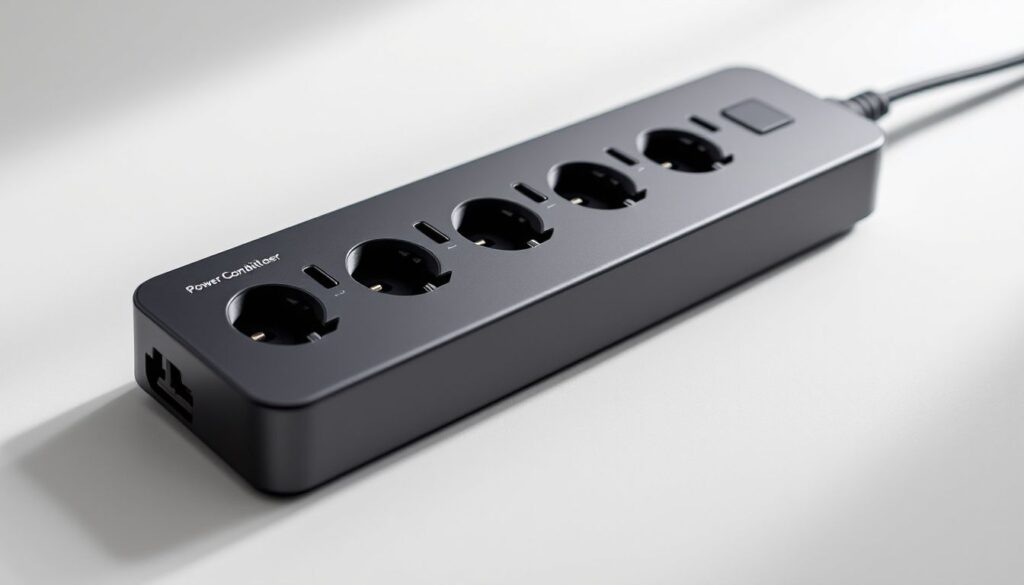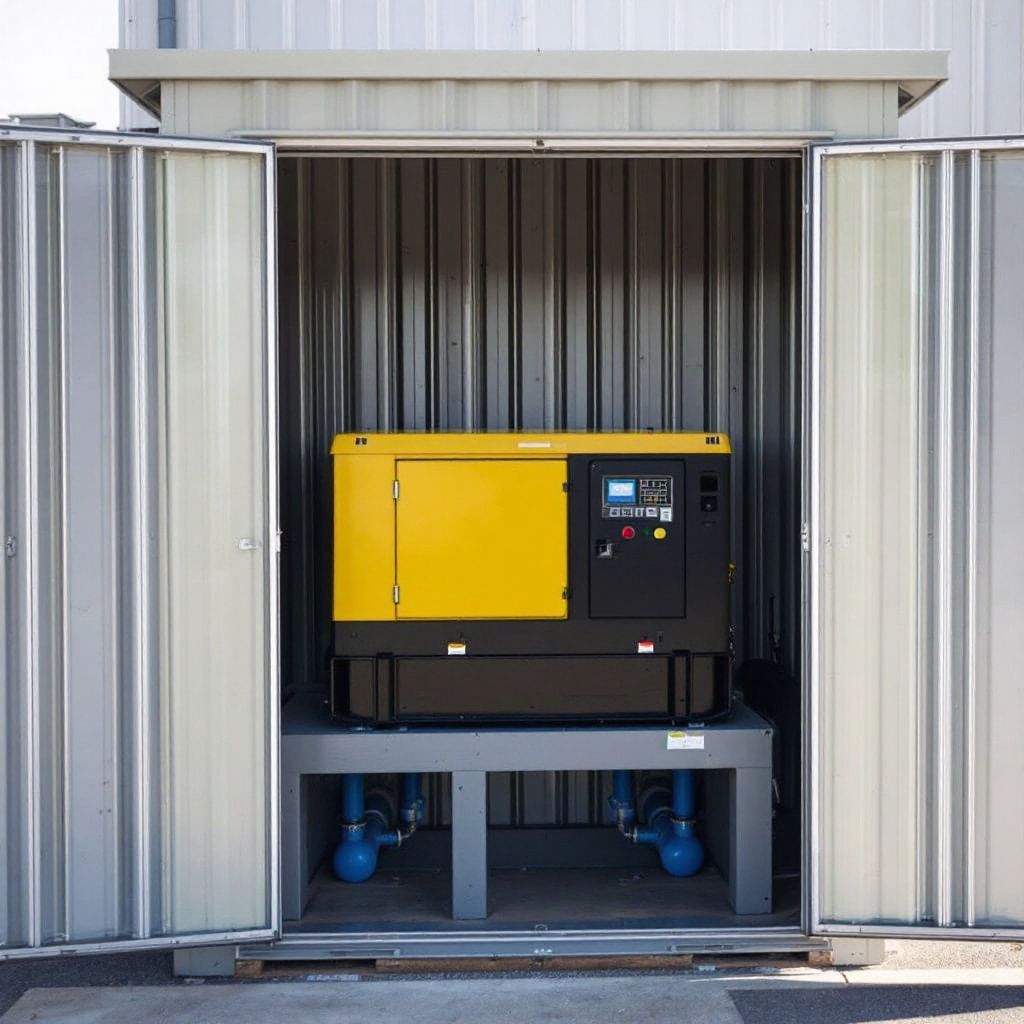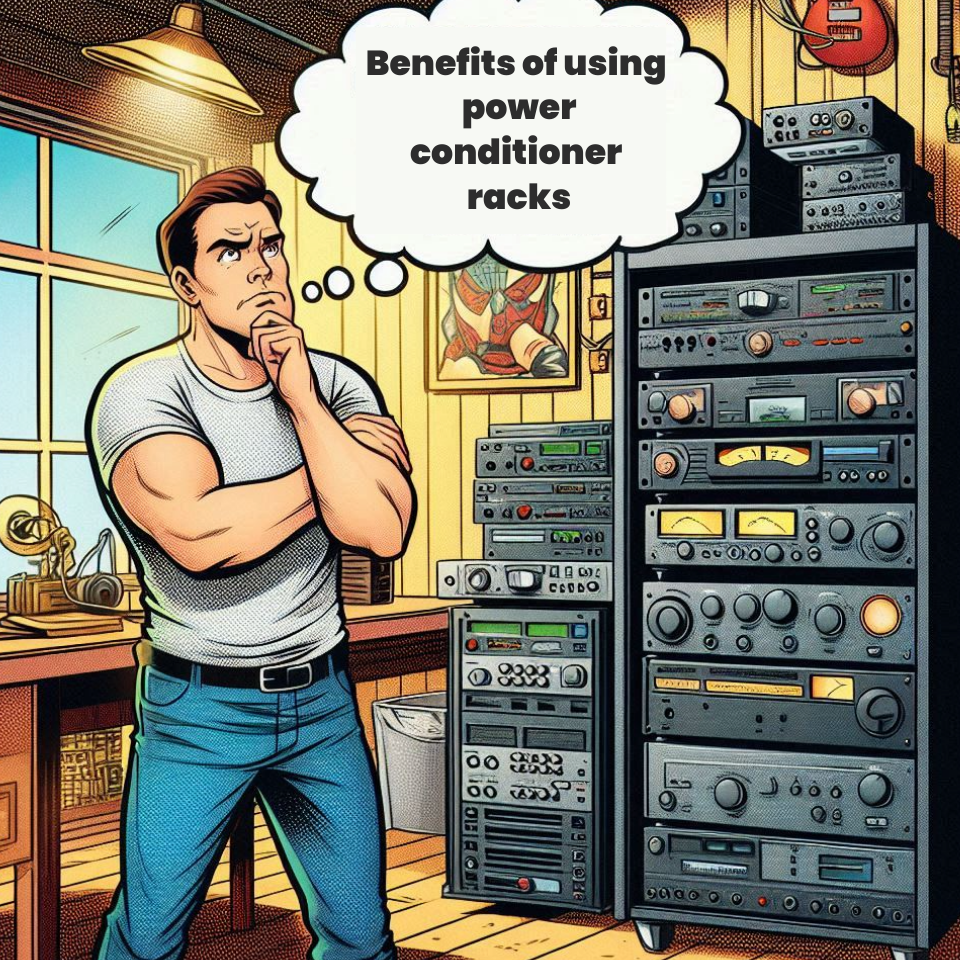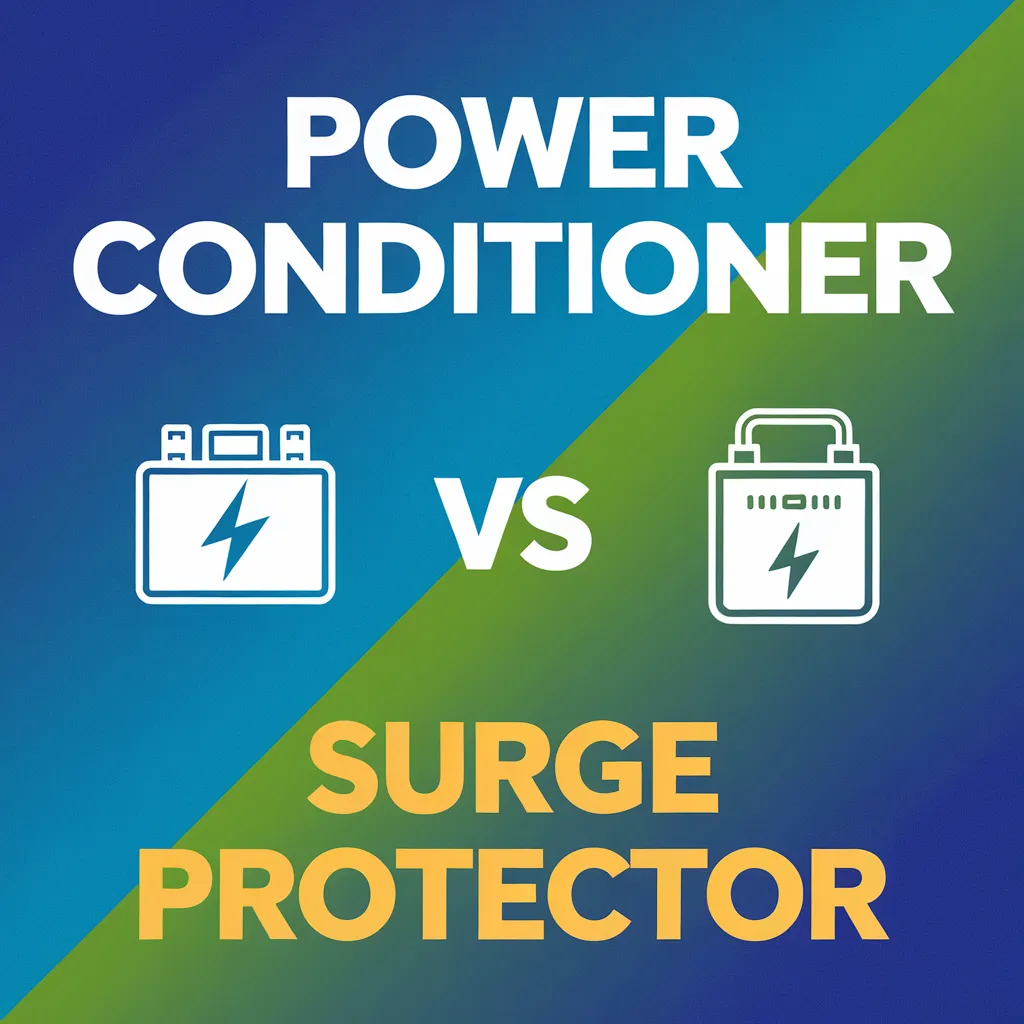
A power conditioner, or what is power conditioner, is an essential device that ensures the quality of electricity powering your equipment remains stable and clean. It actively regulates voltage, filters out electrical noise, and eliminates disturbances like spikes or surges.
These issues, often referred to as “dirty power,” can harm sensitive electronics or reduce their efficiency. By addressing these problems, a power conditioner protects valuable devices and enhances their performance. Whether for industrial machinery or home electronics, it plays a critical role in maintaining reliable and consistent power delivery.
What is a Power Conditioner?
A power conditioner is an essential device that ensures the electricity powering your devices is clean, stable, and reliable. It acts as a safeguard, protecting electronics from voltage fluctuations, electrical noise, and other disturbances.
Many people ask, “what is power conditioner?” Simply put, it’s a tool designed to enhance the quality of power delivered to your equipment. Whether you’re using sensitive home electronics or industrial machinery, a power conditioner ensures optimal performance and longevity.
Definition and Core Functionality
At its core, a power conditioner improves the quality of electrical power supplied to connected devices. It achieves this by performing several critical functions:
-
Voltage Regulation: It stabilizes voltage levels, preventing damage caused by sudden spikes or drops.
-
Noise Filtering: It removes electrical noise and interference, which can disrupt the performance of sensitive equipment.
-
Surge Protection: It shields devices from power surges and spikes that could otherwise cause irreversible damage.
-
Harmonic Distortion Mitigation: It reduces distortions in the electrical waveform, ensuring a cleaner power supply.
These features make a power conditioner indispensable for environments where power quality directly impacts the functionality of devices. For example, in homes, it protects appliances like televisions and computers. In industrial settings, it safeguards critical systems from disruptions caused by unstable power.
Why Power Quality is Essential for Modern Devices
Modern devices rely heavily on consistent and clean power to function correctly. Poor power quality can lead to several issues, including reduced efficiency, frequent malfunctions, and even permanent damage.
Here’s why maintaining power quality is crucial:
-
Sensitive Electronics Require Stability: Devices like computers, medical equipment, and audio systems are highly sensitive to voltage fluctuations. Even minor inconsistencies can disrupt their operation.
-
Electrical Noise Impacts Performance: Electrical noise, often caused by other appliances or external interference, can degrade the performance of connected devices. A power conditioner eliminates this noise, ensuring smooth operation.
-
Prolonged Device Lifespan: Unstable power can wear out components faster. By providing clean and stable electricity, a power conditioner extends the lifespan of your electronics.
-
Prevention of Downtime: In industries, power disturbances can halt operations, leading to significant losses. A power conditioner minimizes such risks by maintaining consistent power delivery.
In today’s AI-infused world, where technology plays a vital role in daily life, ensuring power quality is no longer optional. A power conditioner bridges the gap between raw electricity and the refined power modern devices need to operate efficiently.
How Does a Power Conditioner Work?
A power conditioner operates as a vital tool to ensure the delivery of clean and stable electricity to your devices. It performs several key functions that address common power issues, such as voltage fluctuations, electrical noise, and surges.
Let’s check out how it works in detail.
Voltage Regulation and Stabilization
Voltage inconsistencies can harm sensitive electronics or reduce their efficiency. A power conditioner acts as a voltage regulator, ensuring that connected devices receive the correct voltage at all times. It stabilizes power by compensating for sudden spikes or drops in voltage.
For instance, when the incoming voltage exceeds safe levels, the power conditioner reduces it to prevent damage. Similarly, if the voltage dips below the required threshold, it boosts the supply to maintain stability.
This regulation is especially important for modern electronics, which rely on precise voltage levels to function properly. Devices like computers, medical equipment, and audio systems benefit significantly from this feature.
Without a voltage regulator, these devices may experience malfunctions or even permanent damage.
Noise Filtering and Interference Reduction
Electrical noise, often referred to as noise on the power line, can disrupt the performance of connected devices. This noise originates from various sources, such as household appliances, dimmable lights, or external electromagnetic interference.
A power conditioner with noise reduction capabilities filters out these disturbances, ensuring a cleaner power supply.
The process involves removing unwanted frequencies and harmonics that interfere with the normal operation of electronics. By eliminating this noise, the power conditioner enhances the performance and reliability of your devices.
For example, audio systems deliver clearer sound, and computers operate without unexpected glitches. This feature is crucial in environments where precision and consistency are essential.
Surge Protection and Power Line Conditioning
Power surges, caused by lightning strikes or sudden changes in electrical demand, pose a significant threat to electronic equipment.
A power conditioner with surge protection shields devices from these potentially damaging events. It absorbs excess energy during a surge, preventing it from reaching your equipment.
In addition to surge protection, power conditioners perform power line conditioning. This involves smoothing out irregularities in the electrical waveform, such as harmonic distortions. By doing so, the device ensures that the power delivered to your electronics is both stable and clean.
This dual functionality makes a power conditioner more comprehensive than a standard surge protector.
The combination of surge protection and power line conditioning not only safeguards your devices but also extends their lifespan. Sensitive equipment, such as industrial machinery or home theater systems, operates more efficiently when protected from power disturbances.
Benefits of Using a Power Conditioner
A power conditioner offers several advantages that directly impact the performance, reliability, and lifespan of your electronic devices. Let’s explore these benefits in detail.
Protection Against Voltage Spikes and Fluctuations
Voltage spikes and fluctuations can wreak havoc on sensitive electronics. A power conditioner acts as a shield, ensuring equipment protection by stabilizing the voltage supply. When a voltage surge occurs, such as during a lightning strike or sudden electrical demand, the power conditioner absorbs the excess energy.
This prevents damage to connected devices. Similarly, it compensates for voltage dips, maintaining a steady flow of electricity.
This feature is especially critical for environments with frequent power disturbances. For instance, industrial facilities often experience voltage fluctuations due to heavy machinery.
A power conditioner ensures clean power delivery, reducing the risk of downtime and costly repairs.
Reduction of Electrical Noise and Interference
Electrical noise, often referred to as noise on the power line, can disrupt the functionality of your devices. This interference may come from household appliances, dimmable lights, or even external electromagnetic sources.
A power conditioner excels at noise reduction by filtering out these disturbances. It removes noise and ensures a stable power supply, which is essential for sensitive equipment.
For example, audio systems often suffer from hum and buzz caused by ground loop hum or other electrical noise. A power conditioner eliminates these issues, resulting in clearer sound quality.
Similarly, computers and medical equipment benefit from noise removal, as it enhances their system performance and reliability.
Enhanced Performance and Longevity of Electronics
Unstable power not only affects performance but also shortens the lifespan of electronics. A power conditioner ensures that devices receive consistent and clean power, which reduces wear and tear on internal components.
This leads to improved efficiency and extended longevity.
For instance, devices like home theater systems, industrial machinery, and medical equipment operate more effectively when protected from power surges and noise. The absence of hum and other electrical disturbances allows these systems to function at their best.
Over time, this translates to fewer repairs, lower maintenance costs, and better overall performance.
Improved Reliability for Sensitive Equipment
Sensitive equipment, such as medical devices, semiconductor manufacturing tools, and advanced audio systems, demands a stable and clean power supply to function effectively. Even minor power disturbances can disrupt their operation or cause irreversible damage.
A power conditioner ensures these devices receive consistent electricity, free from harmful fluctuations or interference.
Power conditioners excel in environments where precision is critical. For instance, semiconductor facilities rely on clean power to maintain the accuracy of their manufacturing processes. Voltage fluctuations or electrical noise can compromise the quality of semiconductors, leading to costly production errors.
A power conditioner mitigates these risks by actively filtering out noise, stabilizing voltage, and correcting harmonic distortions.
In medical settings, the reliability of sensitive equipment directly impacts patient care. Devices like MRI machines and ventilators require uninterrupted and stable power to operate safely.
A power conditioner acts as a safeguard, ensuring these machines perform without interruptions caused by power disturbances. This reliability not only enhances system performance but also provides peace of mind in critical situations.
For home users, sensitive electronics like high-end audio systems or gaming setups benefit significantly from a power conditioner.
Electrical noise or voltage sags can degrade sound quality or cause system malfunctions. By delivering clean and stable power, a power conditioner ensures these devices operate at their peak performance, offering an enhanced user experience.
The improved reliability provided by a power conditioner extends the lifespan of sensitive equipment.
Stable power reduces wear and tear on internal components, minimizing the need for repairs or replacements. Whether in industrial, medical, or residential settings, a power conditioner proves indispensable for maintaining the functionality and longevity of critical devices.
Types of Power Conditioners
Power conditioners come in various types, each designed to meet specific needs. Understanding these types helps in selecting the right one for your home or workplace.
Basic Power Conditioners for General Use
Basic power conditioners serve as entry-level solutions for improving power quality. They focus on essential functions like surge protection and noise filtering. These devices are ideal for general use, such as protecting home appliances, televisions, and computers.
I once used a basic power conditioner for my home office setup. It effectively reduced electrical noise from nearby appliances, ensuring my computer and printer operated smoothly.
While these conditioners lack advanced features like voltage regulation, they still provide reliable protection against common power disturbances.
For most households, this type offers an affordable way to safeguard electronics.
Advanced Power Conditioners with Voltage Regulation Features
Advanced power conditioners go beyond basic protection. They include voltage regulation capabilities, ensuring a stable power supply even during fluctuations.
This feature is crucial for sensitive equipment like medical devices, audio systems, and gaming setups.
I remember installing an advanced power conditioner for my home theater system. It not only protected my equipment from voltage spikes but also enhanced the sound quality by eliminating electrical noise.
These conditioners often support devices requiring a pure sine wave UPS, making them suitable for high-performance electronics. Their ability to stabilize voltage and filter noise ensures optimal performance and longevity for connected devices.
Industrial vs. Residential Power Conditioners
Industrial and residential power conditioners differ in their design and application. Industrial models handle higher power loads and offer robust features like harmonic distortion mitigation and three-phase power support.
They are commonly used in factories, data centers, and hospitals. Residential conditioners, on the other hand, focus on protecting household electronics and appliances.
In my experience, residential power conditioners work well for homes with frequent power disturbances. I once faced repeated issues with my audio gear due to voltage spikes.
Installing a residential power conditioner acted as an insurance policy, protecting my equipment and improving its reliability. Industrial conditioners, however, are better suited for environments where power quality directly impacts large-scale operations.
Choosing between these types depends on your specific needs. For home use, residential models provide adequate protection.
For businesses or industrial settings, investing in a high-capacity industrial power conditioner ensures uninterrupted operations.
Limitations of Power Conditioners
While power conditioners provide significant benefits, they are not a one-size-fits-all solution. Understanding their limitations helps in making informed decisions about when and where to use them.
What Power Conditioners Cannot Address
Power conditioners excel at regulating voltage, filtering noise, and protecting against surges. However, they cannot resolve every power-related issue. For example, they do not generate power or compensate for prolonged power outages.
If your area experiences frequent blackouts, you would need an uninterruptible power supply (UPS) or a generator to maintain power continuity.
Another limitation lies in their inability to handle extreme voltage drops or sustained overvoltage conditions. In such cases, devices like voltage stabilizers or transformers may be more effective.
Power conditioners also cannot fix wiring problems within your home or facility. Faulty wiring, loose connections, or outdated electrical systems require professional inspection and repair.
Additionally, power conditioners do not improve the efficiency of poorly designed electrical systems.
If your equipment consumes excessive energy due to inefficiencies, a power conditioner will not reduce energy consumption. It only ensures that the power supplied is clean and stable.
How to Choose the Right Power Conditioner
Selecting the right power conditioner ensures your devices receive the protection and performance they need. With various options available, understanding key factors can simplify the decision-making process.
Key Factors to Consider (e.g., power needs, device compatibility)
When choosing a power conditioner, I always start by assessing the specific requirements of my devices. Different electronics have varying power needs, and not all conditioners are compatible with every device. Here are some critical factors to evaluate:
-
Power Requirements: Determine the wattage or amperage your devices consume. High-power equipment, like industrial machinery, may require a more robust power conditioner than home electronics.
-
Device Sensitivity: Sensitive devices, such as medical equipment or high-end audio systems, demand advanced features like voltage regulation and noise filtering.
-
Environment: Consider the location where the power conditioner will be used. Industrial settings often face more severe power disturbances than residential areas.
-
Voltage Compatibility: Ensure the power conditioner supports the voltage range of your region and devices. For example, U.S. devices typically operate on 120V, while many international systems use 220V.
I once faced issues with my home theater system due to electrical noise. After researching, I realized that a power conditioner with noise filtering capabilities was essential for improving sound quality.
Understanding these factors helped me make an informed choice.
Budget and Cost Considerations
Cost plays a significant role in selecting a power conditioner. Prices vary widely based on features and capacity.
Basic models are affordable but may lack advanced functionalities. Advanced conditioners with voltage regulation and surge protection cost more but offer comprehensive protection.
Here’s a simple comparison to help you decide:
|
Type |
Features |
Price Range |
Best For |
|---|---|---|---|
|
Basic Power Conditioners |
Surge protection, noise filtering |
$50 – $150 |
Home appliances, general use |
|
Advanced Power Conditioners |
Voltage regulation, EMI/EFI filtering |
$200 – $500+ |
Sensitive electronics, home theaters |
|
Industrial Power Conditioners |
High capacity, harmonic distortion mitigation |
$1,000+ |
Factories, data centers, hospitals |
I recommend balancing your budget with the level of protection your devices require. Spending a bit more upfront can save you from costly repairs or replacements later.
Recommended Use Cases for Power Conditioners
Power conditioners excel in specific scenarios. Knowing when and where to use them ensures you get the most value. Here are some common use cases:
-
Home Theaters and Audio Systems: These setups benefit from noise filtering and voltage stabilization. A power conditioner enhances sound clarity and protects expensive equipment.
-
Medical Equipment: Devices like ventilators and MRI machines require uninterrupted, clean power. A power conditioner ensures reliability in critical situations.
-
Industrial Machinery: Factories often experience voltage fluctuations due to heavy equipment. Industrial-grade power conditioners maintain consistent power delivery, reducing downtime.
-
Offices and Workstations: Computers, printers, and networking devices perform better with stable power. A power conditioner minimizes disruptions caused by electrical noise or surges.
In my experience, using a power conditioner for my home office setup improved the performance of my computer and printer.
It also provided peace of mind, knowing my devices were protected from unexpected power issues.
Choosing the right power conditioner depends on understanding your needs, evaluating costs, and identifying suitable use cases. With the right device, you can ensure your electronics operate efficiently and last longer.
A power conditioner ensures clean, stable electricity for your devices, protecting them from voltage spikes, electrical noise, and surges. Understanding what is power conditioner reveals its critical role in improving power quality and extending the lifespan of electronics.
From eliminating disruptive hum to enhancing performance, its benefits are undeniable. Choosing the right one depends on your specific needs, such as device sensitivity or environmental conditions.
Asking the right questions when purchasing ensures you make an informed decision. Investing in the right power conditioner safeguards your equipment and enhances reliability.
FAQ
What is the primary purpose of a power conditioner?
A power conditioner ensures that electronic devices receive clean, stable, and reliable electricity. It regulates voltage, filters out electrical noise, and protects against power surges. These functions safeguard sensitive equipment from damage and improve their performance.
Can a power conditioner prevent power outages?
No, a power conditioner cannot prevent or compensate for power outages. It works to stabilize and clean the electricity supplied to your devices. For uninterrupted power during outages, you would need an uninterruptible power supply (UPS) or a generator.
Do I need a power conditioner for my home?
If your home experiences frequent voltage fluctuations, electrical noise, or power surges, a power conditioner can be beneficial. It protects appliances like televisions, computers, and audio systems. However, in areas with stable power supply, it may not be necessary for basic devices.
Are power conditioners suitable for industrial use?
Yes, industrial power conditioners are designed to handle high-capacity loads and protect critical systems. They mitigate issues like harmonic distortions, voltage sags, and electrical noise. Factories, data centers, and hospitals often rely on them to ensure uninterrupted operations.
Can a power conditioner improve the lifespan of my electronics?
Yes, a power conditioner extends the lifespan of electronics by providing clean and stable power. It reduces wear and tear on internal components caused by voltage fluctuations and electrical noise. This leads to fewer repairs and replacements over time.
What types of devices benefit the most from a power conditioner?
Sensitive devices like medical equipment, audio systems, gaming setups, and industrial machinery benefit the most. These devices require consistent and clean power to function effectively. A power conditioner ensures their reliability and performance.
Is a power conditioner expensive?
The cost of a power conditioner varies based on its features and capacity. Basic models range from $50 to $150, while advanced ones can cost $200 or more. Industrial-grade conditioners are more expensive but offer robust protection for critical systems.




